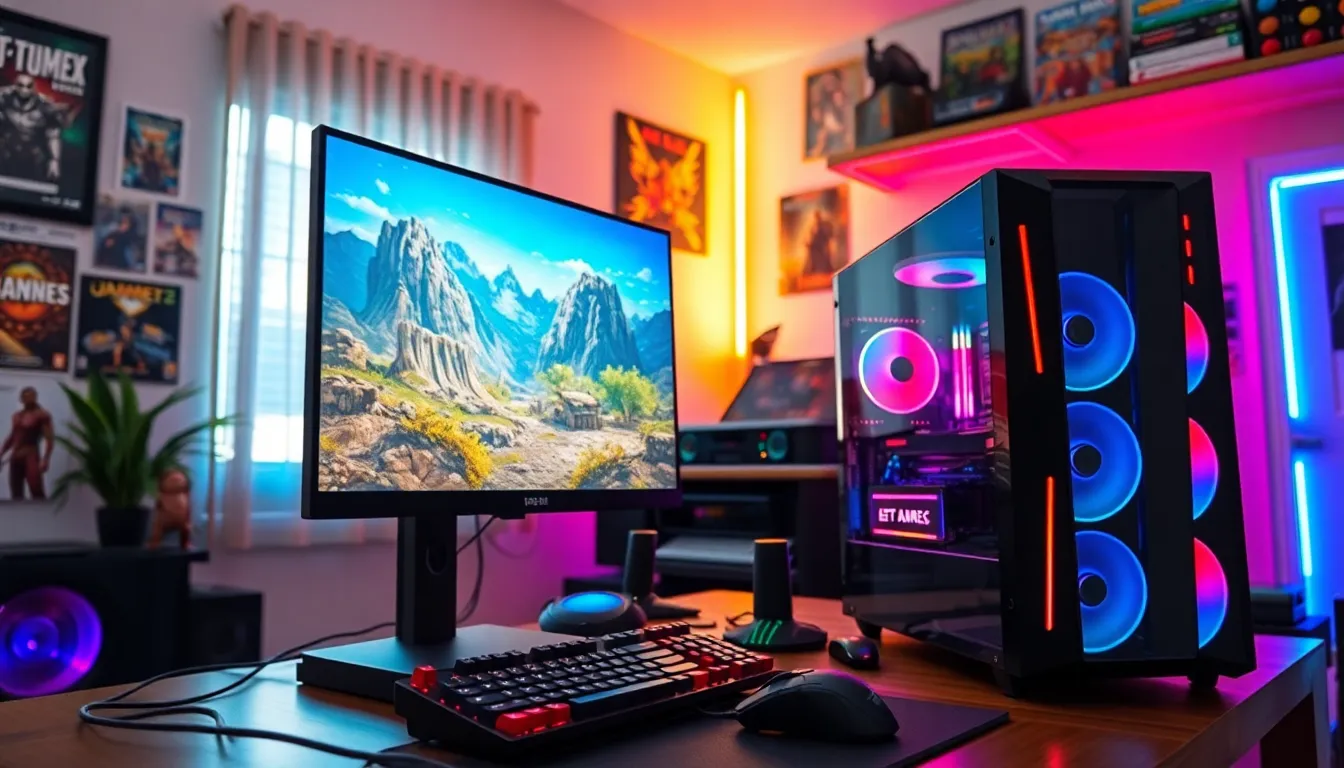Table of Contents
ToggleIn an era dominated by high-tech advancements and an ever-growing digital landscape, PC gaming has carved out its niche as a powerful medium for entertainment and social interaction. While consoles have their loyal fan bases, PC gaming offers a unique experience that cannot be overlooked. This article dives into the various facets of PC gaming, exploring its rise, benefits, essential hardware, popular genres, and what lies ahead for this vibrant community. Readers are invited to embark on this journey through the world of PC gaming, where passions run high and innovation knows no bounds.
The Rise Of PC Gaming

The landscape of gaming has transformed dramatically over the past few decades. From the early days of simplistic computer games to today’s visually stunning masterpieces, PC gaming has evolved alongside technology. Initially overshadowed by consoles, PCs are now recognized for their unparalleled versatility and power.
The 1990s marked a pivotal moment in PC gaming, with graphics capabilities rapidly improving, allowing developers to create immersive 3D worlds. The launch of Windows 95 made PCs more user-friendly, further cementing their place in the gaming arena. By the early 2000s, the advent of broadband internet expanded online gaming, fostering communities and competitive play that continuously attract new players. Today, PC gaming commands a substantial market share, with millions participating globally through platforms like Steam, Origin, and Epic Games Store.
Benefits Of PC Gaming Versus Consoles
When comparing PC gaming to consoles, several advantages become apparent. Firstly, performance is a key consideration. PCs can be customized with high-end components that deliver superior graphics, faster load times, and smooth gameplay, especially for demanding titles. This is particularly valuable for competitive gamers who seek every possible edge.
Another significant benefit is the versatility of PC gaming. With a PC, players have access to a wider library of games, including indie titles not available on consoles, as well as mods that enhance or completely change the gaming experience. Also, features like backward compatibility allow PC gamers to enjoy a range of older titles without compatibility issues.
Besides, the ability to upgrade hardware means that gamers can keep their systems relevant much longer than console generations. A well-optimized PC can outperform the latest console, which often has a limited lifespan.
Essential Gaming Hardware For PC Gamers
For those venturing into the realm of PC gaming, having the right hardware is crucial. At the core of an effective gaming system lies the central processing unit (CPU). This acts as the brain of the computer, processing information and executing commands. Similarly, the graphics processing unit (GPU) is essential for rendering high-quality visuals, making it a priority for gamers, particularly those who relish graphic-intensive games.
Beyond these components, having adequate RAM, typically a minimum of 16GB, is necessary for smooth multitasking and gameplay. Storage options also play a significant role: solid-state drives (SSDs) are preferred for faster load times. Also, peripherals such as mechanical keyboards and high-precision mice enhance the overall experience, offering tactile feedback and customization options that can elevate gameplay.
Finally, a high-refresh-rate monitor can make a noticeable difference, providing smoother motion and better responsiveness, critical in fast-paced gaming scenarios.
Popular Game Genres Among PC Gamers
The rich tapestry of PC gaming is woven together by various genres, each attracting its own dedicated fanbase. First-person shooters (FPS) dominate with titles like “Call of Duty” and “Counter-Strike,” combining skill and strategy for intense gameplay.
Role-playing games (RPGs) such as “The Witcher” series and “Elder Scrolls V: Skyrim” offer players deep narratives and immersive worlds. Meanwhile, real-time strategy games like “StarCraft” and “Age of Empires” provide tactical challenges that require quick thinking and planning.
Besides, massively multiplayer online games (MMOs) like “World of Warcraft” foster community engagement, allowing thousands of players to interact in expansive virtual environments. Each genre offers different experiences, ensuring that PC gaming can cater to a diverse range of interests.
Building Your Own Gaming PC: A Step-By-Step Guide
Building a gaming PC can be an exciting venture. It empowers gamers to tailor their systems to their specifications.
- Planning: Start by determining the budget and purpose of the gaming PC. Will it be for casual gaming, or do you need it for competitive play?
- Choosing Components: Research and select the right CPU, GPU, RAM, motherboard, storage, and power supply unit (PSU). Ensure compatibility among components.
- Assembly: Gather tools and workspace. Begin by installing the CPU on the motherboard, followed by RAM and the GPU. Place the motherboard in the case and connect storage, cooling systems, and power.
- Software: Once assembled, install an operating system, typically Windows, and download necessary drivers and gaming platforms.
- Testing: Run stress tests to ensure stability and monitor temperatures to confirm the system operates within safe limits.
Building a PC not only enhances the gaming experience but also serves as an educational try, allowing individuals to understand how their hardware operates.
The Future Of PC Gaming
As technology continually evolves, so does the future of PC gaming. One of the most significant trends is the increasing integration of virtual reality (VR) and augmented reality (AR). These technologies promise to revolutionize the way gamers experience immersive worlds, making gameplay more engaging than ever.
Also, cloud gaming is gaining traction, allowing players to stream games directly without the need for expensive hardware. This trend democratizes gaming accessibility, enabling those with lower-end systems to enjoy high-quality titles.
Also, the rise of artificial intelligence in gaming development holds tremendous potential. Enhanced NPC behaviors and adaptive difficulty can create personalized experiences that respond to individual players. As gaming communities continue to grow, the emphasis on cross-platform play will also increase, breaking down barriers between PC and console gamers.
Conclusion
PC gaming stands as a robust pillar in the gaming industry. Its rise has been fueled by technological advancements, community engagement, and the evolving desires of gamers. With unmatched performance, the opportunity to build unique systems, and diverse genres, it continues to attract a multitude of players. As we look forward, innovations in VR, cloud gaming, and AI promise to catapult PC gaming into uncharted territories, ensuring it remains at the forefront of interactive entertainment. Embracing this journey offers not only thrilling experiences but a glimpse into the future of gaming.





